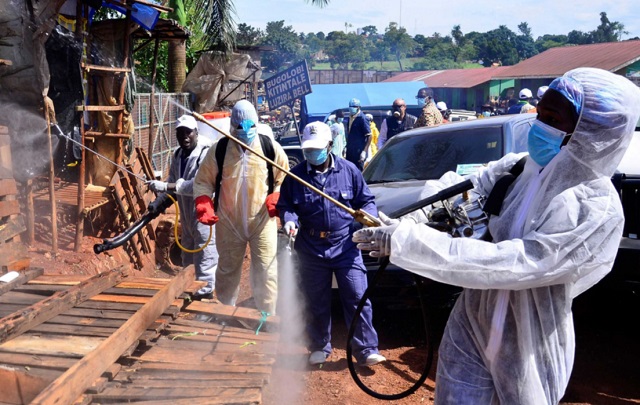
With frustration rising over haphazard responses to the coronavirus, community networks are filling the void across the continent
| ANDREW GREEN | On April 14, Ugandan President Yoweri Museveni announced he was adding three weeks to the country’s initial two-week lockdown. The restrictions were among the strictest on the continent—dusk-to-dawn curfews, public and private transportation grounded, the closure of all but the most essential businesses—but Museveni insisted the additional time was needed to “help us to defeat this virus decisively or, if not defeated totally, to prepare better as to how to cope with it.”
Leaders across sub-Saharan Africa have taken the same gamble, calculating that their citizens’ threadbare resources could last long enough to give officials the time they need to slow the spread of the virus and cobble together a more sustainable response. And they seem to have widely succeeded, at least in gaining the first objective. There is an emerging consensus in the region that the early lockdowns successfully reduced the number of new infections and clearly communicated the seriousness of the pandemic to citizens—particularly in communities dangerously short on health workers and hospital equipment.
But as the weeks drag on and restrictions are lifted slowly, if at all, desperation has grown and so has people’s outrage. Demonstrations have sprung up in Zimbabwe and Uganda, as citizens protest their government’s failure to support them through the lockdowns. The early lockdown orders often overlooked the needs of the sick, the pregnant, and the large portions of the population dependent on wages from informal jobs to feed their families. It didn’t help that many countries enforced their lockdowns with guns and tear gas.
“There is this adoption of what is going on outside Africa—locking down economies, leaving the essential businesses to run—but you have to have a strategy to ensure your citizens are able to feed themselves amidst the lockdown,” said Lynda Iroulo, a research fellow at the GIGA Institute for African Affairs in Hamburg, Germany.
In too many places, that strategy was slow to materialise, leading global officials to warn of worst-case scenarios that involved dozens of countries descending into famine.
The repeated extensions, like Uganda’s, signal something more alarming: a breakdown in the agreement citizens thought they were entering with their governments when the lockdowns began—that officials would take extraordinary measures to lessen the costs as rapidly as possible. Instead, community leaders in countries as varied as Kenya, Nigeria, Uganda, and Zimbabwe worry that their governments have arrived at the limits of their lockdowns without workable next steps. They accuse their governments of prolonging lockdowns—inadvertently spurring widespread hunger, fueling domestic violence, and reversing hard-won gains against other infectious diseases, such as tuberculosis and malaria—without capitalising on that time to examine early data and develop strategies that would allow a return to relative normality while containing the spread of the coronavirus.
That means millions of Africans may soon emerge from lockdowns poorer, hungrier, and at no less risk of contracting COVID-19 than when they entered.
This fear is compounded by the worsening situation in countries like Ghana, which actually had cohesively mapped out the next phase of its response. Cases there have spiked from 1,042 on April 19, the day before restrictions eased, to 6,269 a month later.
In response, local nonprofits and community groups are increasingly marshaling their own resources to meet the mounting needs of their members. These informal services they provide—from delivering hot meals to medicine—are far from comprehensive and are a struggle to sustain, but they are critical not only to rescue the most vulnerable but as a form of activism that allows them to set the terms for what a localised response should look like.
Milly Katana, a Ugandan public health expert, long fought for access to lifesaving antiretroviral medicine for HIV patients. The region has a history of community-led responses, pressuring governments to expand proven treatment strategies and ensuring marginalized groups were not excluded from services, and Katana is certain the most successful coronavirus responses will follow a similar script.
“People will come and be at the forefront of advocating for better management of the disease,” she said.
A new blueprint endorsed by the World Health Organization (WHO) attempts to help guide countries toward this next phase, describing a general trajectory that includes rapidly increased testing, which could inform localised strategies to respond to specific transmission patterns, while lifting the broader restrictions causing unintended harms. South Africa and Ghana have provided early examples of how to translate this template into actual policies.
When Ghana locked down its two major cities, Accra and Kumasi, in late March, officials began rapidly ramping up testing for the virus and tracing of people who had come into contact with those infected. That gave the government the confidence to begin easing the lockdown on April 20, well ahead of much of the rest of the subcontinent. South Africa, which is currently in the midst of a phased easing of its own shutdown—which began March 26—has also unveiled a $26 billion stimulus plan it hopes will reverse some of the harm done by its restrictions. To help fund it, the government has approached the International Monetary Fund for the first time—the country should be eligible to apply for more than $4 billion in financing.
 The Independent Uganda: You get the Truth we Pay the Price
The Independent Uganda: You get the Truth we Pay the Price


